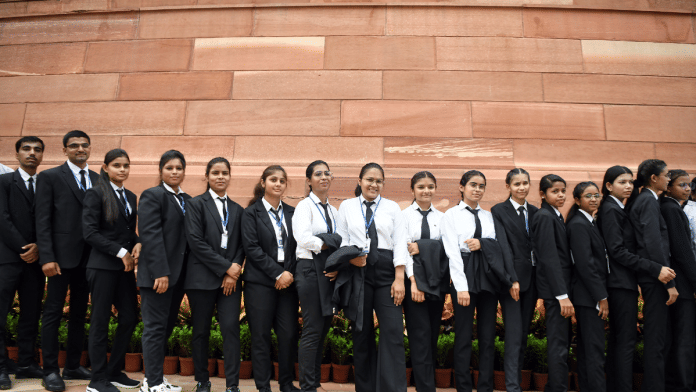Bengaluru: The state education policy (SEP) announced by Karnataka almost a year ago remains in the works over several issues, including differences throughout the undergraduate programmes, ThePrint has learnt.
Although the Siddaramaiah-led Congress government has done away with four-year degree courses and returned to the three-year programme, this would be a disadvantage for students compared to their counterparts from other parts of the country, experts said.
“The most problematic part is 2021-22, 2022-23, 2023-24… These batches whoever has taken admission under the NEP, they will continue in the scheme. Retrospectively, you cannot change anything since these students will continue according to NEP guidelines. But this year (2024-25), students will not be given this option,” said a member of the expert committee formed to draft the SEP.
On 29 July 2020, the Centre approved the New Education Policy (NEP) 2020, which, it said, paves the way “for transformational reforms in school and higher education systems in the country”, replacing the National Policy on Education, 1986.
This was when the country, along with the rest of the world, was coming to terms with the Covid-induced lockdowns.
Barely a year later, in August 2021, Karnataka under the BJP government became the first state to implement the NEP, disregarding protests and opposition from academia, civil society and other stakeholders.
Exactly two years later, in 2023, Siddaramaiah announced that NEP would be scrapped and announced a new education policy for Karnataka.
The first batch of NEP in Karnataka will pass out sometime in 2024 and the last batch will pass out in 2027. In universities, those who joined in 2024 will come under SEP.
Also Read: Vokkaliga seer asks Siddaramaiah to step down as Karnataka CM, make way for DK Shivakumar
‘Social justice & 3-yr degree course’
In May, the Siddaramaiah government said it would withdraw the four-year degree programme as recommended by Prof Sukhdev Thorat-led SEP commission in its interim report.
The 8 May government order said that keeping the four-year degree would “potentially reduce access to undergraduate education for the poor, the socially disadvantage groups such as scheduled castes, scheduled tribes, women and students from rural areas.”
It added that there was a lack of physical infrastructure and non-availability of facilities and faculty, which colleges cited for their unwillingness to continue with four-year programmes.
“The fourth year was an option even in NEP but the previous government completely misinterpreted this and made it a four-year degree course,” the commission member cited above said.
The argument in favour of dropping the four-year degree was that students from poor families would stop going for higher education.
There is also little or no infrastructure, preparation or resources to teach the fourth-year students, if they opt to continue with the programme. “In the interest of social justice, they (state government) decided against this,” the member added.
But, will this not mean that Karnataka, one of the key skill-producing states, is putting youngsters at disadvantage against those from other states that have four-year courses?
Even with scholarships for various sections, students are unlikely to take up the four-year courses, the state argues. This is especially for those from government-run institutions whose options to seek out private education is limited.
“There are central universities in Karnataka that have four year degrees..IISc, Manipal University and even a five-year course in Ambedkar and other private universities. The disparity and lack of uniformity in three- or four-year courses within the state is confusing and is in effect denying equal opportunities for students in government institutions,” the member added.
Also, those students who are following the NEP have the opportunity to continue with the 4th year, if only the colleges are recognised as those that can run the honours course.
“That is the problem. That is why we have said this fourth year is a problem, where we don’t have the numbers. Whereas in a particular stream about 40-50 students clear the degree in three years, only 3-4 will opt for honours. So, again, how will the college have teaching faculty for 3-4 students?” Karnataka minister for higher education M.C.Sudhakar told ThePrint.
‘Old wine in old bottle’
In some universities like Davangere, Bengaluru and Raichur, the state has introduced Kalike Kaushalya wherein in the 6th semester, students are not sent for internships. Instead, from the 5th semester, industries that have MoUs with the state government will go to colleges, and provide skill training to students.
“SEP is old wine in an old bottle,” a vice-chancellor at a public university in Karnataka told ThePrint.
Both NEP and SEP emphasised internships and skill development to complement the stream of education, the V-C said. There are also additional subjects introduced by the state like constitutional values.
But, the state government says it is firm and clear in its position to correct the mistakes made by its predecessors. “I strongly say that they (the BJP government) rushed the implementation of NEP,” Sudhakar added.
The minister said that the structure of education has to be changed from the foundation level and not be directly implemented at the graduation level.
“There is a statistic that because of NEP, the gross enrolment ratio has come down in states. Students are confused. So, in order not to disturb the students who joined NEP starting in 2021, and even last year when our government came, we didn’t immediately withdraw that (NEP). So, these three years of batches will continue under NEP. The new policy will be implemented from 2024-25,” Sudhakar asserted. “So, there is no confusion.”
The final report of the commission is expected later this year.
(Edited by Tony Rai)
Also Read: Siddaramaiah defends fuel price hike amid protests by BJP — ‘don’t we need money for development?’






